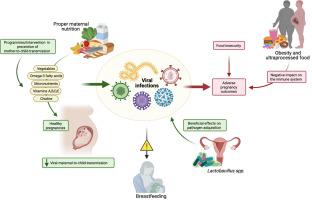Biochimica et Biophysica Acta (BBA) - Molecular Basis of Disease ( IF 4.2 ) Pub Date : 2021-07-31 , DOI: 10.1016/j.bbadis.2021.166231 Alfonso Mate 1 , Claudia Reyes-Goya 2 , Álvaro Santana-Garrido 1 , Luis Sobrevia 3 , Carmen M Vázquez 1

|
Other than being a physiological process, pregnancy is a condition characterized by major adaptations of maternal endocrine and metabolic homeostasis that are necessary to accommodate the fetoplacental unit. Unfortunately, all these systemic, cellular, and molecular changes in maternal physiology also make the mother and the fetus more prone to adverse outcomes, including numerous alterations arising from viral infections. Common infections during pregnancy that have long been recognized as congenitally and perinatally transmissible to newborns include toxoplasmosis, rubella, cytomegalovirus, and herpes simplex viruses (originally coined as ToRCH infections). In addition, enterovirus, parvovirus B19, hepatitis virus, varicella-zoster virus, human immunodeficiency virus, Zika and Dengue virus, and, more recently, coronavirus infections including Middle Eastern respiratory syndrome (MERS) and severe acute respiratory syndrome (SARS) infections (especially the novel SARS-CoV-2 responsible for the ongoing COVID-19 pandemic), constitute relevant targets for current research on maternal-fetal interactions in viral infections during pregnancy. Appropriate maternal education from preconception to the early postnatal period is crucial to promote healthy pregnancies in general and to prevent and/or reduce the impact of viral infections in particular. Specifically, an adequate lifestyle based on proper nutrition plans and feeding interventions, whenever possible, might be crucial to reduce the risk of virus-related gestational diseases and accompanying complications in later life. Here we aim to provide an overview of the emerging literature addressing the impact of nutrition in the context of potentially harmful viral infections during pregnancy.
中文翻译:

母体营养对妊娠期病毒感染的影响
除了作为一个生理过程,怀孕是一种以适应胎儿胎盘单位所必需的母体内分泌和代谢稳态的主要适应为特征的病症。不幸的是,母体生理学的所有这些系统、细胞和分子变化也使母亲和胎儿更容易出现不良后果,包括病毒感染引起的许多改变。长期以来被认为可以先天性和围产期传染给新生儿的妊娠期常见感染包括弓形虫病、风疹、巨细胞病毒和单纯疱疹病毒(最初称为 ToRCH 感染)。此外,肠道病毒、细小病毒 B19、肝炎病毒、水痘-带状疱疹病毒、人类免疫缺陷病毒、寨卡病毒和登革热病毒,以及最近,冠状病毒感染,包括中东呼吸综合征 (MERS) 和严重急性呼吸综合征 (SARS) 感染(尤其是造成持续 COVID-19 大流行的新型 SARS-CoV-2),构成了当前母婴相互作用研究的相关目标怀孕期间的病毒感染。从孕前到产后早期的适当孕产妇教育对于促进总体健康妊娠以及特别是预防和/或减少病毒感染的影响至关重要。具体而言,在可能的情况下,基于适当营养计划和喂养干预的适当生活方式可能对于降低晚年病毒相关妊娠疾病和伴随并发症的风险至关重要。











































 京公网安备 11010802027423号
京公网安备 11010802027423号